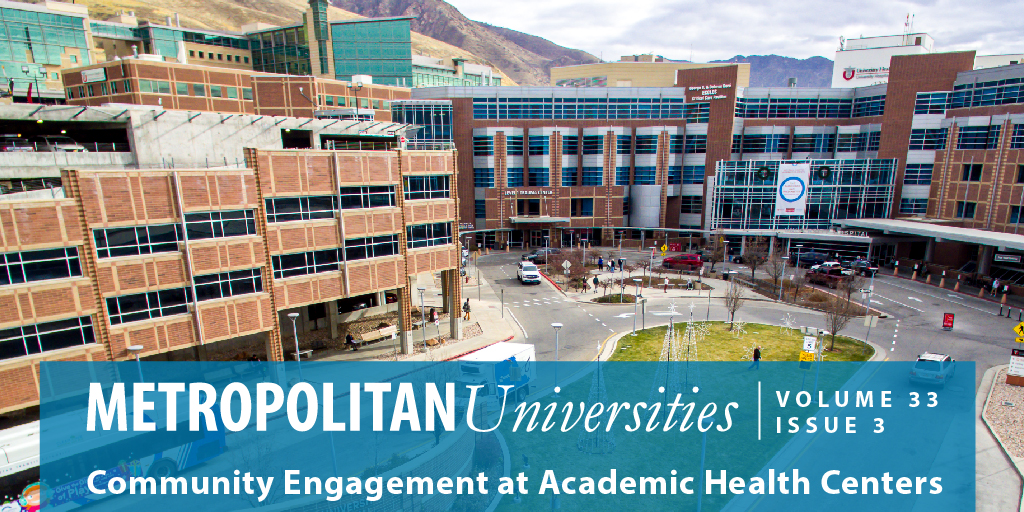Community Engagement at Academic Health Centers
An Introduction to this Special Issue
DOI:
https://doi.org/10.18060/26312Keywords:
community engagement, academic health centers, anchor institutionsAbstract
Academic health centers are essential in many communities, providing health professions education and patient-focused services. These institutions often serve as anchor institutions for community-engaged efforts to serve underserved populations. During the COVID-19 pandemic, the central nature of academic health centers, and the well-being of communities, were on full display. This special issue aims to contribute to and expand our understanding and inform empirically the evidence-based programming, interventions, and policies that strengthen community engagement at academic health centers.
References
Advisory Board. (2015). Why some universities are bidding adieu to academic medical centers. Advisory Board Daily Brief. Retrieved from https://www.advisory.com/daily-briefing/2015/04/24/universities-dropping-amcs on May 12, 2022.
Association of Academic Health Centers. (2022). Academic health centers: Defined. Retrieved from https://www.aahcdc.org/About/Academic-Health-Centers on May 5, 2022.
Birch, E., Perry, D. C., & Taylor Jr, H. L. (2013). Universities as anchor institutions. Journal of Higher Education Outreach and Engagement, 17(3), 7-16.
Centers for Disease Control and Prevention (CDC). (2011). How do you engage a community in a randomized clinical trial or a drug trial? In: Clinical and translational science awards consortium community engagement key function committee task force on the principles of community engagement in principles of community engagement. Retrieved from, https://www.atsdr.cdc.gov/communityengagement/pdf/PCE_Report_508_FINAL.pdf
DeVoe, J. E., Cheng, A., & Krist, A. (2020, April). Regional strategies for academic health centers to support primary care during the COVID-19 pandemic: A plea from the front lines. JAMA Health Forum, 4, e200423-e200423. https://doi.org/10.1001/jamahealthforum.2020.0423
Kishore, S., & Hayden, M. (2020). Community health centers and Covid-19—time for congress to act. New England Journal of Medicine, 383(8), e54. https://doi.org/10.1056/NEJMp2020576
Kulig, J. C., Townshend, I., Kosteniuk, J., Karunanayake, C., Labrecque, M. E., & MacLeod, M. L. (2018). Perceptions of sense of community and community engagement among rural nurses: Results of a national survey. International Journal of Nursing Studies, 88, 60-70. https://doi.org/10.1016/j.ijnurstu.2018.07.018
Maina, G., Mishak, B., de Padua, A., Strudwick, G., Docabo, A., & Tahir, H. (2017). Nurses taking the lead: A community engagement and knowledge exchange forum on substance abuse and addiction in Prince Albert, Saskatchewan. Nursing Leadership (Toronto, Ont.), 30(3), 80-92. http://doi.org/10.12927/cjnl.2018.25382
Meurer, L. N., Young, S. A., Meurer, J. R., Johnson, S. L., Gilbert, I. A., & Diehr, S. (2011). The urban and community health pathway: Preparing socially responsive physicians through community-engaged learning. American Journal of Preventive Medicine, 41(4), S228-S236. https://doi.org/10.1016/j.amepre.2011.06.005
Schoch-Spana, M., Franco, C., Nuzzo, J. B., & Usenza, C. (2007). Community engagement: leadership tool for catastrophic health events. Biosecurity and Bioterrorism, 5(1), 8-25. http://doi.org/10.1089/bsp.2006.0036
Shalowitz, M. U., Isacco, A., Barquin, N., Clark-Kauffman, E., Delger, P., Nelson, D., ... & Wagenaar, K. A. (2009). Community-based participatory research: A review of the literature with strategies for community engagement. Journal of Developmental & Behavioral Pediatrics, 30(4), 350-361. http://doi.org/10.1097/DBP.0b013e3181b0ef14
Downloads
Published
Issue
Section
License
Copyright (c) 2022 Joseph Allen, Melissa Yack, Sara Hart

This work is licensed under a Creative Commons Attribution 4.0 International License.



